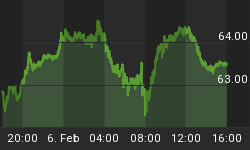On January 3, 2013, stocks and gold collapsed upon release of FOMC minutes from the December 11-12, 2012 meeting. The bearer of Fed opinion was Jon Hilsenrath at the Wall Street Journal. Zero Hedge noted after the sacred tablets were disseminated that it took "Hilsenrath 12 whopping minutes to release a 589-word article analyzing the FOMC minutes. At least we know one of the people who had the embargoed version hours ago." The implication being the Wall Street Journal was permitted to read the minutes before the transparency-minded Fed let the rest of us know. Zero Hedge did not mention the FOMC Minutes are 7,044 words long and the market-moving FOMC discussion commences after 4,394 words. It is possible that Hilsenrath did not read the Minutes at all, but was handed a press release from one of the Fed's P.R. firms. The latter are best equipped to lead the public into the Fed's pre-approved ditch.
There was, in fact, absolutely nothing in the Minutes (reading from word 4,394) worth anyone's time. The discussion does not (as stocks, gold, Hilsenrath, and Bloomberg inferred) intimate the Fed may cut short its money-printing scheme in mid-2013. It was a meeting of confusion as to, not only how long the FOMC might continue its wealth-destroying scheme, but also what it should buy, what should prompt it to stop, and how it would identify an opportunity for a "smooth transition" towards removing accommodation. In short, paralysis reigned. The transition would include raising rates, a purely hypothetical discussion since the Fed can never do so. The notorious free market is the party that will decide when rates will rise.
The FOMC Minutes do not disclose who said what. Following is some handy information that may save you time. Having read dozens of FOMC transcripts, released five years after the meetings (why has the Fed only released transcripts through 2006, in the year 2013?), you can take the following to the bank: the Federal Reserve governors are the only voices that matter.
There are seven governors. They meditate in the Eccles Building, are Washington toadies, and can all be counted upon to support whatever the chairman wants. That is particularly true today, since the governors are a pack of ambitious academics, so have never held an independent thought in their lives.
The 12 regional presidents are window dressing. All attend the meetings but only five vote at any one time. Thus, the governors hold a 7-5 advantage when the FOMC votes. I take Jim Bianco's word for it (Bianco Research) that Chairman Bernanke was embarrassed by three "nay" votes in August 2011. Simple Ben does not want this to happen again. One dissent is apparently not embarrassing since that is often what we see.
I take Jim's word for this nonsense, since, in a sane world, Chairman Bernanke would be more embarrassed every time he opens his mouth, given what comes out of it. But he's a lifelong bureaucrat, on campus and now a civil servant, so form matters since that's all they've got. If it were not for this needless decorum, opinions of Fed regional presidents could be entirely dismissed. As it is, 2013 is a bumper year for Bernanke since three of the five voting presidents express greater deference to Bernanke than Uriah Heep ever hoped to reveal. These are William Dudley (New York: the New York president is a permanent member of the FOMC), Charlie Evans (Chicago) and Eric Rosengren (Boston). Esther George (Kansas City) and James Bullard (St. Louis) round out the voting members in 2013. Both George and Bullard have independent streaks, but neither is consistent.
Charles Plosser (Philadelphia), Richard Fisher (Dallas), and Jeffrey Lacker (Richmond) make the news with occasional tirades against the Fed's policy, but they are not voting in 2013. Also, their bark is often worse than their bite. They make good copy but neither has consistently voted against the majority.
It could be said, that having destabilized markets and the economy to such an extent, 2013 looks like a "very good year for irrational exuberance" in credit. Thus said the last Federal Reserve governor worth listening to, Larry Lindsey. Here, he was warning Chairman Alan Greenspan at the December 1996, FOMC meeting that credit had run wild wherever he looked, including the stock market. Greenspan responded with a joke that fell flat. Lindsey never attended another meeting.
Frederick Sheehan writes a blog at www.aucontrarian.com
















